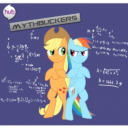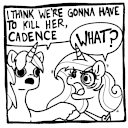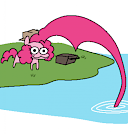
There's a notion that Twilight doesn't understand very well : the fourth wall. Thankfully, her friend Pinkie is here to help her and make her understand. Or, at least, try not to confuse her even more.
This is a translation of my "most popular" (and shorter) story. I'm sorry if the grammar is incorrect. You can find the original here.



















This is a brilliant little story, I'll try to get back in the morning and drop a comment on the grammar.
A couple of quick things though:
10751943
Could you give an example for the first thing ? In French, we have very different rules for speech-marks (I don't even fully master them in my mother tongue) so an example could really help me there.
Reading it out loud is what I do most of the time, especially for translation. But while my level in english isn't that bad, I still say some stuff that aren't right.
Thanks for reading. And the compliment. I was affraid this would be a total grammar catastrophe.
10752435
I’ll give a full example with your story as context later in this comment, but here’s a short one:
“This… thing,” said Jacques, his face contorted in utmost disgust,“how is it even alive?”
The internal clause here is between the pieces of the spoken sentence. Since the sentence didn’t end before the narration, commas are used to separate this clause.
Now onto the comment proper
It’s far more natural to say “I’ll explain it for you” as you are giving someone your time, and this is not a physical object. Your version is, however, still grammatically correct.
Here the “she” should be capitalised as the clause within the quotation marks has been closed. Also, here it should just be “except laugh” as except pairs with the infinitive, not the imperfect.
“as an example” as Pinkie is not giving the example an example, she is showing an example to Twilight. Also, “enough” should be followed by a full stop and “Answered” should be capitalised.
This is the first passage where the pronouns get a bit unclear, so let's tidy them up:
“kind of weird, and could not always follow her,” the “she” reads like it's describing Pinkie, rather than Twilight.
“whilst still being funny for some inexplicable reason” The first part was in perfect tense when it should have been in imperfect (continuous) tense. The article “an” is specific, whilst “inexplicable” is very much not, so the article “some” is used instead.
I’m just going to rewrite this, I can explain the issues in a separate comment later if you would prefer.
“The 4th wall, Twilight,” expertly explained the party pony, “Is what separates the person looking at you, or reading about you, from the story itself. It’s a border that allows the author to maintain some kind of logic within the story. Personally, I love it.”
The dreaded full-stop after interested, “interested, ‘carry on?’ “.
“It” should be replaced with “that” to include the entire previous statement, and the article “a” is unrequired, as “harmless” provides both adverb and article.
“Reader” fits better as a plural in both these lines, and gendering the reader is redundant so “readers themselves?” and “public that they’re watching”, especially since “that” is always coded as plural.
“Proceed” should be in past tense (“proceeded”) and “waved” does not contain an “i”. “Why she was” makes it sound like Twilight is waving at the shelf, try: “why Pinkie was”.
This “didn’t” is present imperfect, “understand”.
“Sense” is misspelt. A comma should be used after Twilight as a new clause has begun. “It” is singular and therefore does not describe the whole statement, “That”. (A full stop before the second piece of direct speech is correct, as the first clause was closed with ellipsis.)
I'm going to rewrite this utilising en-dashes. This is due to the excessive use of commas muddling the course of the sentence.
"It's easy. When all your characters stay in their story, without getting out of it, you aren’t breaking the fourth wall. As soon as one breaks this rule – whether by knowing something they shouldn't, being anachronistic, or by saying something that doesn't make any sense in context but does for the reader as a reference or similar – then you're breaking the fourth wall."
“Eyebrows” is always plural, unless a character is missing one. An eyebrow doesn’t “frown” it “furrows”. “Giggles” is a plural noun, you are looking for the verb “giggle”. Additionally, one makes a face, rather than being “given” one.
Again, like a face, you “make” an example, rather than “take” one.
“Understood” is past perfect, you want the imperfect “understand”. “Between the previous” is rather ambiguous, try “that and the”.
Direct speech is generally in the present tense. “You didn’t get it?”
The "that" after "except" is unnecassary. Also, try just using “Pinkie” rather than “the pink one”.
Try is a verb, so you just “try”, she could, however, “make an attempt” if that flows better.
Here her words should be in past tense: “you couldn’t hear” “how did you know I’d”
^box
"
“Ellipsis” should be plural. “ellipses”
Contrary to all sense, “it’s” is a contraction, not a possessive. You want “its”
“Have enough” is missing a few articles, it seems excessive but the correct phraseology is “have had enough of this”.
I hope that’s helped, it may be slightly overcomplicated though. An easy way to get your grammar checked is to just switch whatever software you're using to english, or any other language it is being translated into.
Please ask for further clarification if you need any.
10752619
Thank you for taking the time to do this. I'll make sure to do the appropriate corrections.